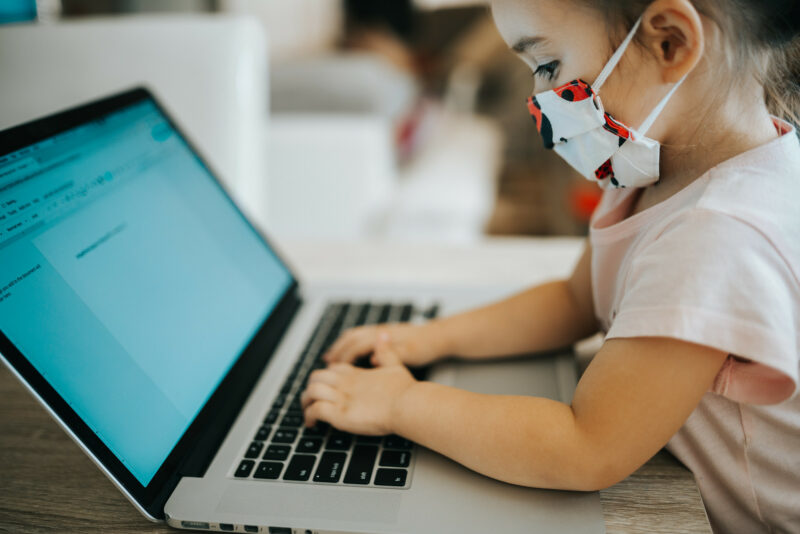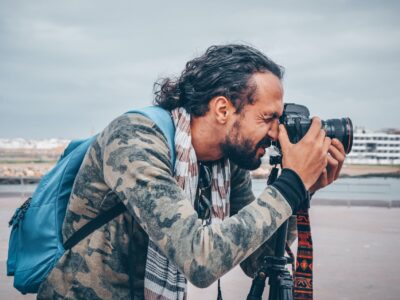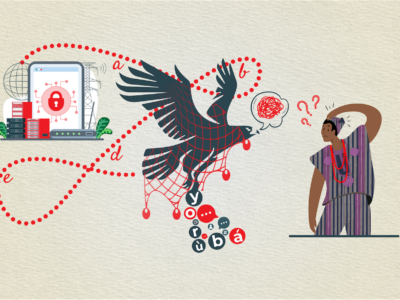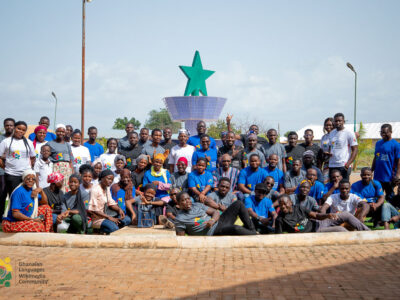RV Newsletter: Code Girls United seeks to promote gender equity in STEM education

Online teaching. Little girl working on the laptop. (Nenad Stojkovic / CC BY 2.0 DEED)
Rising Voices note: Our monthly newsletter provides a summary of our recent blog posts about all aspects of digital inclusion including access to and adoption of digital tools, as well as different ways and opportunities for communities to fully participate online. Read here for previous editions of this newsletter.
Hope this November is finding you well, dear readers.
If you’ve been following us, you are probably no stranger to Solve, an MIT initiative that continues to seek out innovative solutions for pressing challenges of our days. In this issue, we’d love to highlight for you a winner of their Gender Equity In Stem Challenge this year: Code Girls United.
This is an organization gearing to help girls explore the fun of coding. Based in Montana, USA, they offer free after-school programs to girls from the 4th to the 12th grade from rural and tribal communities across the state, hoping to mitigate the educational and gender gap.
If you are interested in knowing more about them, you can visit the MIT Solve page here. Of course, we’d be happy to hear from you about projects alike around the world.
MORE FROM THE RISING VOICES BLOG
Interested in learning first hand about how the internet and technology play a role in the promotion and revitalization of Indigenous, minority, endangered, or under-resourced languages? Rising Voices and partners are now bringing to you a new round of our rotating Twitter campaigns for 2023, featuring language digital activists around the world each week. Come follow us and hear what they have to share!
@ActLenguas (Latin America)
- Andrés ta Chikinib [es]: a Tsotsil language digital activist based in Mexico, who aspires to ensure a future for the language
- José Koyoc [es]: a historian and the founder of the K'ajlay project, a digital history platform of the peninsular Mayan peoples
- Julio López [es]: a Tseltal speaking activist from Mexico , who leverages the power of radio for the promotion of his language/culture and intends to expand his digital activism to platforms such as YouTube and Facebook
- Esther Abisag Aguilar [es]: a Mexico-based teacher-to-be, who leverages the power of social platforms to encourage the use of her language and to safekeep ancestral knowledge for fellow young Mayans
- Saraí Jiménez Orozco [es]: an Ayöök teacher from Mexico, who wishes for her Mixe variant to have a better presence on digital media and media in general
In this issue, we’d also like to take you to the MENA region, learning about the misrepresentation Nubians experience in the digital space, which reflects discrimination against them in the offline world and that may leave multifaceted consequences in the long run. Meanwhile, in Monteagudo, Bolivia, a group of high school students are seeking to redefine the narratives on climate change by bringing in local perspectives, hoping to help promote environmental awareness.
OPPORTUNITIES | SCHOLARSHIPS & FELLOWSHIPS
Are you a language activist working to promote your language via digital platforms? We think this Language Lodge Social Media Internship, as offered by the Smithsonian Center for Folklife and Cultural Heritage might be your cup of tea. Note: A work permit is needed for overseas applicants to take on this virtual internship; further questions in this regard (and in general) can be directed to Hali Dardar.
For those who are interested in a journalism traineeship, Deutsche Welle is now taking applications for a 18-month program starting in January, 2025: a salaried opportunity to gain hands-on experience and to explore future trends of the field. Further details, along with eligibility requirements, can be found here. Application due: November 27, 2023 at 12pm (GMT+1)
Already a working journalist, you say? The Nieman-Berkman Klein Fellowship is calling for journalists with original ideas as to how journalism can evolve along with the digital space for a year-long program at Harvard on journalism innovation. Further details on the fellowship can be found here. Application due: December 1, 2023 (international)/January 31, 2024 (US)
UPCOMING EVENTS & CONFERENCES
For those who wish to learn about how the development of AI and technology in general can benefit us all — especially people with visual impairments — for a world of better accessibility, Sight Tech Global might be an event of your interest. It’s a virtual event intended not only for technologists and researchers, but also for designers and advocates, and you can register for free here. Date: December 6–7, 2023
TOOLS & RESOURCES
And for those who love languages: If you are looking for some audio-visual materials in Irish for the home setting, we feel that you might enjoy these videos as prepared by Tús Maith. Just so you know: You are very welcome to share with us resources alike — be it in Irish or other minoritized/endangered languages.
If you are interested in telling stories via podcasts, instead, it might be worth your while to check out these two self-paced courses — Podcasting: The Big Idea and Podcasting: Making It — jointly created by the Thomson Foundation and University of Melbourne. We wish you a good start in podcast making!
MORE TO READ, WATCH and LISTEN TO
- How to recruit professionals with disabilities to your company (& retain them) via InclusionHub
- AI-generated content & a11y via InclusionHub
Subscribe to the Rising Voices Newsletter
Support our work
Since Rising Voices launched in 2007, we’ve supported nearly 100 underrepresented communities through training, mentoring, microgrants and connections with peer networks. Our support has helped these groups develop bottom-up approaches to using technology and the internet to meet their needs and enhance their lives.
Please consider making a donation to help us continue this work.



